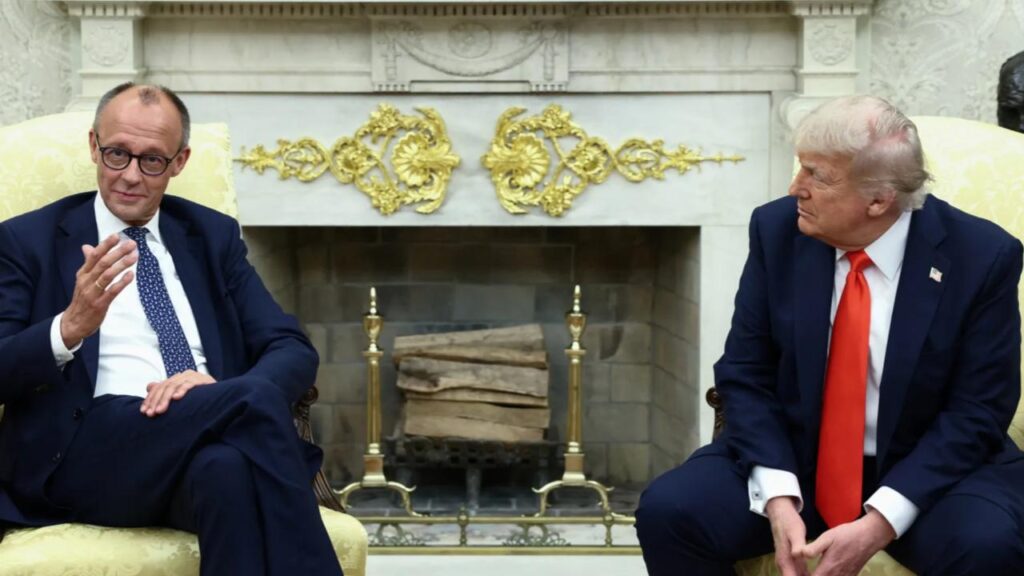In a series of high-stakes meetings this week, President Donald Trump left America’s traditional allies reeling—and recalibrating. His blunt remarks, transactional demands, and overtures to adversaries like Russia have signaled a seismic shift in U.S. foreign policy, effectively dismantling the post–World War II international order. For many European leaders, the message is clear: the era of American-led multilateralism is over.

Trump’s Shocking Meeting with U.S. Allies Signals
| Takeaway | Stat or Quote |
|---|---|
| NATO defense spending surge | Allies near agreement on raising defense spending to 5% of GDP |
| Trump’s stance on Ukraine conflict | Compared Ukraine-Russia war to “two children fighting in a park” |
| European intelligence concerns | Europe remains heavily reliant on U.S. intelligence, causing unease |
| Formation of Weimar+ alliance | European nations form new alliance to assert autonomy |
President Trump’s recent engagements with U.S. allies mark a definitive departure from the collaborative ethos that has characterized American foreign policy for decades. By prioritizing transactional relationships and national interests, the administration challenges the foundations of the existing world order. Allies are now compelled to adapt, forging new alliances and strategies to navigate an increasingly uncertain global environment.
A New Tone in the Oval Office
During his meeting with German Chancellor Friedrich Merz on June 5, Trump adopted a markedly different tone from previous administrations. He likened the ongoing Ukraine-Russia conflict to “two children fighting in a park,” suggesting that continued fighting might be necessary before peace is achievable. This analogy, while aiming to simplify the complex geopolitical situation, was met with concern by European leaders who fear it downplays the gravity of the war.
Merz, in contrast, emphasized the importance of holding Russia accountable and urged Trump to apply pressure on Moscow to end the conflict. He also pledged to increase Germany’s defense spending to 3.5% of GDP, aligning with Trump’s long-standing demands for greater NATO contributions.
Allies Reassess Their Strategies
Trump’s approach has prompted U.S. allies to reconsider their reliance on American leadership. European nations, in particular, are exploring ways to bolster their own capabilities. The formation of the Weimar+ alliance, comprising countries like France, Germany, Poland, the UK, and Italy, signifies a move towards greater European autonomy in defense and foreign policy. This group aims to coordinate efforts independently of U.S. influence, especially concerning the Ukraine conflict.
Moreover, European dependence on U.S. intelligence has come under scrutiny. A recent CIA alert about a Russian assassination plot against a German defense executive highlighted the continent’s vulnerability and the need for more robust, independent intelligence frameworks.
Economic Tensions and Trade Wars
Trump’s protectionist policies have reignited trade tensions with traditional allies. His administration’s proposed tariffs on European goods, particularly German autos, have raised alarms in EU capitals. While Trump delayed a 50% tariff on EU goods, he indicated that future trade decisions would depend on ongoing negotiations, leaving European economies in a state of uncertainty.
The proposed Mar-a-Lago Accord, aiming to restructure global trade and monetary relations, further exemplifies Trump’s intent to prioritize American economic interests, even at the expense of longstanding partnerships.
The Global Implications
Trump’s foreign policy shift has broader implications beyond Europe. In Asia, U.S. allies like Japan and South Korea are closely monitoring the situation, wary of America’s commitment to regional security. Defense Secretary Pete Hegseth’s recent warnings about China’s ambitions underscore the need for a cohesive strategy, yet Trump’s unpredictable approach leaves allies uncertain.
As the U.S. retreats from its traditional role, other powers may seek to fill the void, potentially leading to a more fragmented and volatile international landscape.






